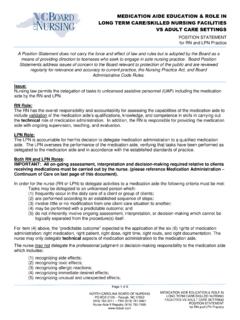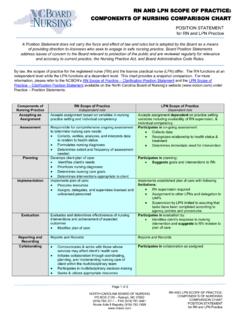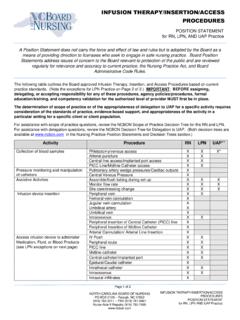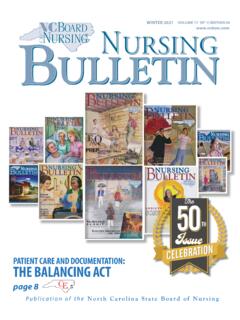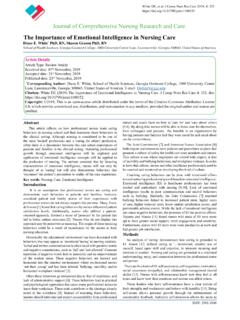Transcription of By Crystal Tillman Harris, RN, MSN, CPNP INCIVILITY IN …
1 16 {Official Publication of the No r t h Ca r o l iN a Board of nursing } ..ulletinBulletinBNursiNgNursiNgBy Crystal Tillman Harris, RN, MSN, CPNPWHAT EXACTLY IS INCIVILITY ? INCIVILITY is one term used to describe rude, disruptive, intimidating, and undesirable behaviors that are directed toward another person (Clark, 2011). INCIVILITY is any action that is offensive, intimidating, or hostile that interferes with the learning or practice environment. Although INCIVILITY has always been around, INCIVILITY seems to be an increasing problem for organizations and is getting worse. INCIVILITY often results in psychological or physiological distress for the people involved.
2 If INCIVILITY is left unaddressed, it may progress into more threatening situations or behaviors. Victims of INCIVILITY may experience symptoms such as stress, anxiety, exhaustion, sleeplessness, depression, anger, and the literature will produce numerous articles with terms such as: lateral violence , horizontal violence , relational aggression or simply what it really is - bullying . Many nurses know colleagues, nursing faculty or nursing leaders who practice INCIVILITY . People who engage in INCIVILITY use abnormal, aggressive behaviors to gain control and power. Unfortunately, these people have not developed healthy coping behaviors and/or skills in their relationships with occurs in groups or individual interactions.
3 Listed are some various INCIVILITY combinations which are possible: provider or management bullying a nurse nurse bullying another nurse nurse bullying a patient patient bullying a nurse nursing faculty bullying a student THE IMPACT OF INCIVILITYI ncivility wreaks havoc on nurses relationships and workplace morale, as well as the bottom line - patient safety. INCIVILITY is far more widespread than most of us realize, and INCIVILITY in health care settings has devastating a victim of INCIVILITY is also costly to organizations. Nurses put in less effort, produce lower quality, and can even burn out. According to Banishing Burnout by M.
4 Leiter and C. Maslach (2005), the annual cost of job stress alone due to INCIVILITY at US corporations is $300 billion. INCIVILITY is a major cause of workplace frustration and is illegal if based on protected personal categories such as race, religion, gender or disability. However, no laws prevent other types of workplace INCIVILITY , unless it verges on mental or physical to Zolby (2007) many of us are affected by workplace INCIVILITY / bullying : 37% US workers directly experienced bullying 12% witnessed bullying 45% had their health affected due to stress from bullying 3% file lawsuits related to bullying 40% experience bullying but never complainDr.
5 P. M. Forni is the co-founder of the Johns Hopkins Civility Project, author of Choosing Civility, and also a leader in in-civility research. As Forni (2008) stated, INCIVILITY often occurs when people are stressed, unhappy, or rushed. When these coincide, anything can happen. Incivil-ity erodes self-esteem, damages relation-ships, increases stress, contaminates the work environment, and may escalate into violence . It is important to note that many times the person exhibiting the uncivil behavior is unaware of how his or her behavior, words or actions may be affecting others. According to Clark, uncivil behaviors exist along a continuum ranging from disruptive behaviors on one end, to threatening behaviors on the other (See Figure 1).
6 The graph illustrates that INCIVILITY at the left end of the scale can be expressed by some fairly subtle behaviors such as eye-rolling, arm-crossing and walking away - the kind of actions that nurses often excuse by saying, so and so is having a bad day. Overt expressions of INCIVILITY , such as bullying , taunting, and intimidation are more apparent and most reported in media. However, as shown in the Purpose: To provide nurses with information about the impact of INCIVILITY , and strategies to promote a culture of : After reading this article and on-line references, the nurse should be able to: 1. Describe the impact of INCIVILITY on nursing practice, patients, and health care Identify the range of behaviors associated with INCIVILITY .
7 3. Discuss strategies to promote a culture of civility in nursing NUrsINg17 {Official Publication of the No r t h Ca r o l iN a Board of nursing } ..Continuum of INCIVILITY graphic, this can begin in what appears to be a relatively benign manner, with behaviors such as sarcastic comments or dominating conversation in a group. It is essential to any organization to recognize the behaviors at the left end of the continuum, to name them, and ultimately address them to prevent more aggressive acts of anger or violence from occurring. During the NC Board of nursing 2011 Education Summit, Dr. Cindy Clark stated, bullying is allowed to occur for 3 reasons: because it can; because it is modeled; because it is left unchecked.
8 WHAT DOES INCIVILITY LOOK LIKE?As Clark stated in the INCIVILITY continuum, there are a range of uncivil behaviors. Dellasega (2009) came up with common uncivil behaviors which include: using the silent treatment spreading rumors rude or obnoxious behavior badgering or back-stabbing sabotaging a project damaging someone s reputation using humiliation, put-downs, and intimidation failing to support a co-worker setting up someone for failure undermining of work verbal abuse public reprimands sarcasm destroying confidence losing one s temper or yelling at someone continual criticism encouraging others to turn against a co-workerThe effects of INCIVILITY take a toll on all of us.
9 It erodes our self-esteem by wearing down our mental defenses. When we feel vulnerable, there is an increase in anxiety, which can lead to resentment and anger. It also damages our relationships by causing feelings of failure, isolation and loss. It also increases stress, which weakens the immune system, causes wear and tear on the body, spirit and soul. Even worse the effects can lead to depression and post-traumatic stress disorder (PTSD). It also contaminates the workplace by lowering morale, organizational trust and job leaders can be in a difficult situation too. For nurses in a leadership role, to remain silent is to condone the behavior.
10 If leadership accepts the behavior, it makes it harder for others to report the same type of behavior. The nurse may feel his or her leadership approves of the behavior. When in reality, leadership may not realize INCIVILITY is occurring. The behavior needs to be brought to the nurse leader s attention for further action. Do not assume the behavior has probably been reported by another also occurs with student nurses by nurses in practice and nursing faculty. It results in students having decreased confidence, anger, frustration, sleeplessness, anxiety, stress and worry. When student nurses are subjected to bullying by nurses in practice, they are more apt to emulate the behaviors and engage in bullying activities themselves.
